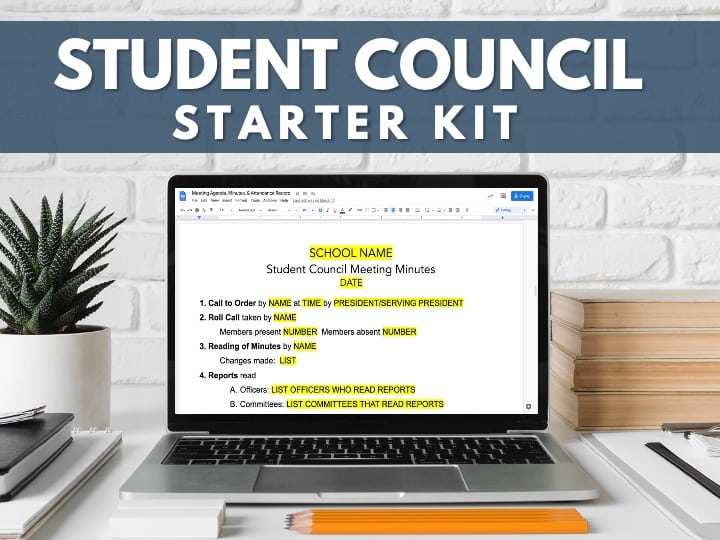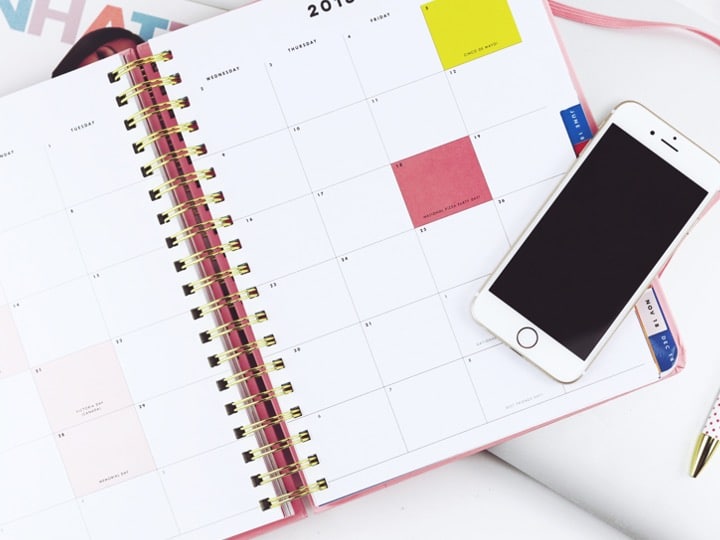If I could go back and tell my brand new student council advisor self just one piece of advice it would, hands down, be this: pencil in all the events for year from the start.
The student council calendar is the central organization hub for planning a successful year. I was so naïve my first year, though, that having one didn’t even occur to me because I only had a vague idea of our calendar of events outside Homecoming week and a few assemblies.
Foreseeing scheduling conflicts, reserving the auditorium way in advance, and deciding the best day for certain events just wasn’t on my radar as an entirely unprepared advisor. I truly didn’t know what I didn’t know.
My second year, I refused to repeat that by-the-skin-of-our-teeth experience again. I was committed to being more organized and purchased a big calendar for my classroom wall. At the start of the school year now, we fill in all the school and student council events for the whole year.
And yes, we use a paper calendar as our central hub. There’s just something easier about flipping through a big, tangible calendar when working with a group. After we have all our dates down, a student duplicates it into a shared Google Calendar and is tasked with keeping the two in synch.
Think about and pick a calendar system that will work best for your program.
I can’t stress enough how this one organizational change made a world of difference in our student council program. It increased our group’s effectiveness in serving our high school and, equally as important, dramatically decreased my stress levels. I hope these calendar planning ideas and tips will do the same for you.
Listed below are all the events we put on our annual calendar. Afterwards, we share out with staff and students so everyone else knows these important dates.
So grab a blank calendar, the upcoming year’s school and sports schedules, and your executive team, school secretary, or anyone else with invaluable institutional knowledge to help you to get started planning your student council calendar of events for the upcoming year.
School Days
This may feel like a no-brainer, but it’s still worth mentioning that you want to start with a calendar that already has the upcoming school year days filled in. Things like:
- Breaks and days off
- Half, early release, and late start days
- Ends of grading periods and teacher conferences
- First day for freshman, last day for seniors, etc.
Holidays, Recognition Days, Weeks, and Months
Next, fill in all the holidays that your students will want to recognize that the school day calendar hasn’t already taken into account. Things like:
- Cultural holidays like Halloween, Valentine’s Day, and Saint Patrick’s Day
- Heritage months like Black History Month and Indigenous People’s Month
- Any major local events like festivals or fairs
- Recognition days, weeks, or months like Teacher Appreciation Week and School Board Appreciation Month (check out this complete list of 37 school and community recognition ideas)
Sports and Co-Curricular Events, Field Trips
It was a total “why-didn’t-we-do-this-sooner?!” moment the year we started including sports and club schedules to our master StuCo calendar. This helps so much when deciding dates for spirt weeks, dances, and assemblies because we want to be inclusive as best we can. If we know the volleyball team has to leave school early for an away game one day, we will schedule our end-of-the-day spirit assembly for a different day.
Even if we don’t know all the exact performances, games, and tournaments just yet at the start of the year, we do know the start weeks for each season and when districts and state finals are. Gather up and pencil in all the events like:
- Sport season start and end dates
- Games, matches, meets, and tournaments
- Play performances and music concerts
- Annual field trips or conferences
- District and state tournaments
Assemblies, Class Meetings, and Spirit Weeks
Every year, the assemblies tend to be the same at our school and I’m sure that’s true for yours as well, so decide them now for the whole year. Exact days aren’t necessarily set in stone year after year and even if they were, teachers don’t keep them top of mind as they plot out their class schedule. So, these kinds of events are some of the most important to not only decide early and write down, but to share out with staff. We all know there is nothing more annoying-yet-totally-avoidable than finding out there is an assembly scheduled with shortened class periods on the day you planned to give a test.
Along with assemblies, now is a great time to plot out any extra class meeting times needed to plan for things like Homecoming, end-of-the-year events, and/or class elections.
I am sure to note “subject to change” since these sorts of events are planned around sports events and such, but when I share them with the staff, they are still so grateful to get a year-at-a-glance head’s up on these bell schedule-altering events.
It’s a priority for us to plan all our assemblies and spirit weeks for times that best include all students. This means choosing times when, as mentioned above, large amounts of students aren’t gone due to a sports event or field trip. Also, we try our best to plan spirit weeks when all, or most all, teams have home games during that week to encourage attendance.
Some common assemblies you may want to plot out on your calendar:
- First-day-of-school welcome back, first week kick-off assemblies
- Fall, winter, and spring spirit assemblies
- Homecoming and spirit week assemblies
- Veteran’s Day, Dr. Martin Luther King, Jr. Day, and any guest speaker assemblies
- Student Council executive board and class elections assemblies
- End-of-year recognition assemblies
Student Council Elections & Annual Events
Check your Student Council Constitution to see if there are specific days or weeks on which you need to hold your elections, but generally it’s recommended to hold executive board elections in early spring, like in March, so outgoing officers have time to mentor their incoming officer replacements.
Class officer elections can usually be held closer to the end of the year as less runway is needed to prepare incoming officers.
Fridays are great days for the elections, with the week leading up designated as “campaign week.” If running an election is a whole other beast you aren’t sure how to tackle, check out these ready-to-go election materials and candidate packets, which will save you so much time and stress.
Also add in any other similar annual student council events, like submitting the annual student council budget or paying membership dues to your state or regional student council association.
School Dances, Traditions, & Seasonal Events
Once all the big during-the-school-day things are plotted, now it’s time to add in all the events that have a bit more flexibility, don’t interfere with the bell schedule as much, or are more wish-list items. These are also likely things that are unique to your school and may not require the same schoolwide coordination as an assembly. Things like:
- Homecoming week events
- Dances, talent shows, and any other activity nights throughout the year
- Prom, graduation, and other end-of-the-year events
- Semi-regular lunchtime games and activities
- Fundraiser drive weeks
- Changing out banners and bulletin boards for each season
- Hot cocoa bar before school and other fun projects (check out more kindness project ideas!)
Student Council & School Board Meetings
Lastly, pencil in all your student council meetings. We hold ours during lunch since we have just one common lunch, but before or after school may be necessary. The most important thing is to be consistent with a time and place that is as accessible as possible for all students to attend.
Because these are routinely held meetings (most councils hold them either once or twice a month) it’s a no-brainer to plot them for the whole year from the start.
If you do monthly, plan for a second-Wednesday-of-the-month type of routine so you don’t get caught off guard turning the calendar page at the start of the month. By getting these dates down, you can decide if certain meetings need to be moved by a day or to another week because of other conflicts.
For everything you need to have students running their own meetings like champs, grab these ready-to-use meeting agenda and minutes templates.
Additionally, if your students are expected to submit a monthly report at your school board or building leadership meetings or have a standing monthly with the principal, pencil those down for the year as well.
Hopefully with just this one tool, your year is already looking far more organized and manageable. But if you are you hoping to streamline your whole Student Council and Leadership program (or starting one from scratch!), then you will love my Student Council Starter Kit. Included are fully editable files of everything you need to draft a constitution, run meetings and elections, as well as supply your students with all sorts of brainstorming ideas to create a fun, positive, and inclusive year.

Feature image credit: Nicola Styles








